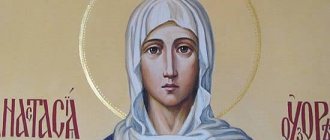In the Orthodox church calendar there are many holy names that are especially revered, but these names, with differences in dates, are often repeated.
But Angel Day, the name day of Valery and Valeria, is rare, with only 2 memorable dates for a man’s and a woman’s name.
There are only four saints with these rare names, and until the 20th century, they were mostly called ministers of the Church. Only much later did these names gain popularity among the Russian population.
Patron saints of Valery and Valeria in Orthodoxy
In the Orthodox Saints, the bearer of the male name Valery has several patron saints:
- Valery Melitinsky, who accepted martyrdom for Christ through torture and beheading;
- Valery of Sebastia, who suffered martyrdom through torture on Lake Sebastia, in severe frost, and died on its shore.
Holy Martyr Valery of Sebaste
Women in Orthodoxy bearing the name Valeria also have two patron saints:
- Valeria of Caesarea, who suffered martyrdom for her religion;
- Valeria, a queen who was forcibly married to the pagan Emperor Maximilian, was executed for her faith in Christ.
We also advise you to familiarize yourself with when Marina’s name day is.
martyr Valery Sevastiysky
Prayer to the 40 Martyrs of Sebaste
Oh, holy, glorious passion-bearers of Christ, the forty, in the city of Sebastia for Christ’s sake, who courageously suffered through fire and water and, like friends of Christ, entered into the peace of the Heavenly Kingdom, have great boldness to intercede with the Most Holy Trinity for the Christian race, especially for who honor your holy memory and call you with faith and love. Ask the All-Bountiful God for forgiveness of our sins and correction of our lives, so that in repentance and unfeigned love, friend, for each other, we will boldly appear at the Last Judgment Court of Christ and through your intercession we will appear at the right hand of the Righteous Judge. She, saints of God, be our protectors from all enemies, visible and invisible, so that under the shelter of your holy prayers we will get rid of all troubles, evils and misfortunes until the last day of our life and thus glorify the great and venerable Name of the Almighty Trinity, the Father, the Son and the Holy Spirit, now and ever and unto ages of ages. Amen.
Akathist to the Saints of the Forty Martyrs of Sebaste
Kontakion 1
The fourty chosen passion-bearers of Christ, in the city of Sebaste, who passed through fire and water and entered into eternal rest, we praise you, our intercessors, with songs. But you, who have great boldness towards the Lord, free us from all troubles, calling to you with love: Rejoice, holy forty martyrs of Sebastia, glorified wonderworkers. Ikos 1
Angels of God, guardians of the human race, seeing your bold confession of Christ before the tormentor, invisibly strengthening you for the suffering feat. We, who have accomplished this feat of goodness, joyfully cry out to you: Rejoice, you who rejoiced at the bold confession of Christ; Rejoice, having astonished your tormentors with your wondrous patience. Rejoice, having put the devil to shame through your sufferings; Rejoice, having armed yourself with the invincible power of Christ against the invisible enemy and all his evil deeds, you have overcome the machinations. Rejoice, decoration of the innumerable martyr’s face; Rejoice, powerful helpers of the militant Churches on earth. Rejoice, holy fourty martyrs of Sebastia, glorified wonderworkers. Kontakion 2
Seeing the bestial tormentor the faith of the martyrs, imprison them; The gracious Lord visited His servants, praising the firstfruits of their feat and admonishing them to unflinchingly complete it, for only the one who endures to the end is crowned in the Kingdom of Heaven and is honored with the angels’ song: Alleluia. Ikos 2
The Divine Mind received Christ from Him who appeared to you, strengthened itself in the suffering struggle, holy passion-bearer, and imputed the reproach of Agricola the tormentor into praise for itself. For this reason we cry out to you: Rejoice, you who have acquired the right mind of the knowledge of God and who have completely surrendered your will to the will of God; Rejoice, you who have counted all the delights of the world and military glory for Christ’s sake as nothing. Rejoice, you who did not listen to the caresses of the tormentor and who were not afraid of his terrible reprimands; Rejoice, Christ’s imprisonment for the sake of those who endured. Rejoice, visited by the Savior of the world in chains, comforted by good words from Him and strengthened for the feat; Rejoice, for with faith you comfort those who honor you in sorrow and deliver them from troubles. Rejoice, holy fourty martyrs of Sebastia, glorified wonderworkers. Kontakion 3
The power of the Most High has made you, holy passion-bearers, strong in speech before the ungodly, and also not tolerating your insolence, the proud tormentor threw you back into prison, in a state of joyful flowing, singing to God: Alleluia. Ikos 3
Possessed, passion-bearers, in the prison of your fellow-sufferer Kirion, good for yourself as a teacher, strengthened in the faith of Christ and, having recently been brought to trial, you fearlessly present yourself to Prince Lysias and Agricolaus to the governor, wisely reproaching their wickedness. For such boldness of yours, we bring you great praises: Rejoice, you have been clothed in the armor of the faith of Christ and covered with the shield of His grace; Rejoice, you who loved the only Christ above all others and for the sake of His command you despised the lawless tormentors. Rejoice, you who preached the power of Christ before the wicked and demonstrated the omnipotence of God; Rejoice, for even throwing stones will not touch you. Rejoice, for by the power of God I return to those who throw; Rejoice, for even now with your prayers to God you are repelling the arrows of the enemy from us. Rejoice, holy fourty martyrs of Sebastia, glorified wonderworkers. Kontakion 4
Breathing in a storm of anger against Christ, the proud Fox threw the sufferers into prison, in which Christ appeared again, encouraging, comforting them and promising incorruptible crowns in the Kingdom of Heaven; They, having heard this, joyfully shouted to God: Alleluia. Ikos 4
Having heard the tormenting, firm confession of the passion-bearers of Christ, I was condemned to stand an all-night vigil in the cold lake; They, having the fire of Divine love in their hearts, were not afraid of the fierce scum, but unanimously glorified God, going to suffer. We, marveling at this patience, call this: Rejoice, confessors of Christ’s good victory; Rejoice, destroyer of idolatry. Rejoice, having through the patience of cruel torment entered into eternal rest; Rejoice, having gained indescribable benefits through the diseases of suffering. Rejoice, dear and strong and forty stones; Rejoice, you who strengthen and illuminate the Church of Christ. Rejoice, holy fourty martyrs of Sebastia, glorified wonderworkers. Kontakion 5
The God-bearing stars of Christ appeared to the saints, shining in the cold of the night in Lake Sebastia, who were not deceived by the warm bath of temptation, but from the angels I bowed to God: Alleluia. Ikos 5
Having seen the saints, as if one fell away from them, fearing the filth of the night, and hiding in a warm bath and dying, I cried out to the Lord with warmth, that He might strengthen them in the struggle of suffering and glorify His name. We call you to this: Rejoice, glorious victorious ones, who have conquered all the machinations of the opposing forces; Rejoice, you who stood by the lake all night. Rejoice, you who called upon the Lord with one accord; Rejoice, for in your patience the Lord sent speedy help to you. Rejoice, for the Divine light shines from heaven upon you; Rejoice, you who have received crowns of light from heaven. Rejoice, holy fourty martyrs of Sebastia, glorified wonderworkers. Kontakion 6
The preachers of the wondrous miracle, the guards, who were in the baths, told how in the night the light of heaven in the lake of the martyrs melted the ice and turned the cold into warmth, having heard the hedgehog, the torment was inflamed with anger, not knowing how to sing to God: Alleluia. Ikos 6
Having risen in the lake to the heavenly light, the grace of God arose in the heart of one from the guards, as if he, having taken off his robe, was cast into the lake by the holy martyr, filling the place of the fallen, and thus the prince of darkness was put to shame, rejoicing at the diminishment of the face of the sufferers; to whom we now cry out this: Rejoice, Christ's passion-bearers, by your prayers and patience you have turned the joy of the devil into sorrow; Rejoice, you who delivered him faithfully from malice and deceit. Rejoice, having been enlightened in the cold water by the grace of the Holy Spirit; Rejoice, for by your standing in the lake of the mental serpent you crushed the head. Rejoice, full of the Pentecostals, having cheerfully presented yourself to Christ; Rejoice, through faith, patience and suffering of Christ, for the sake of inheriting the bliss of paradise. Rejoice, holy fourty martyrs of Sebastia, glorified wonderworkers. Kontakion 7
Although the miraculous sufferers wanted to preserve their faith in Christ immaculately, military glory and the caresses of the tormentors, they imputed nothing and all the fierce torment, like disembodiment, endured, chanting to the all-powerful man-lover God: Alleluia. Ikos 7
The tormentor’s new and final thoughts are the suffering of the holy martyr, so that their legs will be crushed like gold, even though the sufferers have endured valiantly. And so, having completed the martyrdom, he gave up his souls in the hand of God and received incorruptible crowns from Him. We shout in praise to them: Rejoice, beautiful shoots of the garden of Jesus, not with axes, but with hammer; Rejoice, dear vessels of God’s grace, for the contrition of the name of Christ. Rejoice, you who have gloriously ended your suffering feat; Rejoice, you have been received into cohabitation from the faces of the Angels. Rejoice, from the prophets and apostles, for those who followed in their footsteps were kindly met; Rejoice, great glory to the entire Christian race. Rejoice, holy fourty martyrs of Sebastia, glorified wonderworkers. Kontakion 8
The wonderful mother of Saint Meliton, alone from the face of the sufferers, showed strange love for children and undaunted valor; Seeing the bodies of the martyrs, she was taken to be burned, her son, still alive, was treacherously abandoned, taking him on her shoulder, and she, having given up her spirit, presented herself with the rest to Christ God, singing to Him in joy: Alleluia. Ikos 8
All bestiality showed torment, when the holy commanded the bodies of the martyrs to be burned with fire and their ashes thrown into the river, so that their memory would be destroyed from man, otherwise they would be put to shame, but I glorified the Lord to eternal generations before Angels and men. For this reason, we cry out to them: Rejoice, according to the words of the psalmist, you who have passed through fire and water; Rejoice, fellow members of the passion of Christ. Rejoice, for through your suffering deed you have confounded the enemies of the Church of Christ and strengthened the faithful in the faith; Rejoice, vigilant prayer books for the Christian race. Rejoice, you who dwell forever in the abodes of the Heavenly Father; Rejoice, you who ask the Lord for the welfare of the world through your intercession. Rejoice, holy fourty martyrs of Sebastia, glorified wonderworkers. Kontakion 9
All Christians were greatly surprised at how the bones of the holy martyrs miraculously shone brightly at night in their mouths, and honestly gathered, at the command of the saints, generous healings were given to the faithful, so that we sing to the wondrous God in His saints: Alleluia. Ikos 9
The ancient Vetia, illuminated by the Spirit of God, prophetically spoke about the death of the faithful in the Psalter: “I passed through fire and water, and brought us to rest.” You, holy martyrs, have accomplished this deed. For this reason, we cry out to you in praise: Rejoice, having fulfilled David’s prophecy; Rejoice in your sufferings, like gold in a furnace, purified. Rejoice, you who have kept the faith of Christ to the end; Rejoice, for by your intercession to God you save us from troubles. Rejoice, you who help us in sorrows and needy situations; Rejoice, you who teach the salvation of souls. Rejoice, holy fourty martyrs of Sebastia, glorified wonderworkers. Kontakion 10
You are naturally a great helper of our salvation, holy passion-bearers, and we also diligently resort to you; Help us, by your intercession to the Lord, to spend the remaining time of our earthly life in repentance, piously and in all circumstances to gratefully cry out to the Provider God: Alleluia. Ikos 10
With the wall of your prayers, protect us, passion-bearers of Christ, from all the evils and snares of the enemy, so that we protect you, we bless you by name: Rejoice, Kirion, Candida and Domna, teacher of the Divine Scriptures; Rejoice, O angels and Aetie of glory, with your souls, like eagles, flying to heaven. Rejoice, Athanasius, Aglaia, Viviana and Gorgonia, who loved Christ God; Rejoice, Ekdite, Gaia, Eunoices, Eutyches, Dometians and Joannas, who laid down their souls for Christ. Rejoice, Hesychius, Heraclius, Cyril, Claudius, Lysimachus and Leontius, who have received heavenly blessings; Rejoice, Eliana and Elijah, the prophet Elijah, who was jealous of the glory of God. Rejoice, holy fourty martyrs of Sebastia, glorified wonderworkers. Kontakion 11
We offer songs of praise to you, holy martyrs, because for the love of Christ you did not spare your flesh and magnified the triumph of faith with your blood; Likewise, your memory, like the brightest lamps of faith, shines forever in the Church, illuminating the meanings of the faithful who sing to God: Alleluia. Ikos 11
Illuminated by the light of heaven, with intelligent eyes we behold you, glorified passion-bearers of Christ, who stand before the throne of the Most Holy Trinity and boldly bring prayers for peace; We also cry out to you in prayer and praise: Rejoice, passion-bearers of Christ Nicholas, Priscus, Smaragd, Sakerdon, Severians and Sisinii, glorious conquerors of the evils of the enemy; Rejoice, Philokgimon and Theophilus, who accomplished the work of Divine love. Rejoice, Khudione, Xanthie and Flavius, warriors of Christ's goodness; Rejoice, Melitone, Theodula and Valens, most faithful servants of the Most High God. Rejoice, martyrs of Christ Valeria, Alexandra and Akaki, most zealous in fulfilling the commandments of the Lord; Rejoice, through your spring memory you proclaim to us the spring of Christ’s eternal bliss. Rejoice, holy fourty martyrs of Sebastia, glorified wonderworkers. Kontakion 12
The Xiropotamian monastery is abundantly filled with grace, possessing your venerable relics, glorified martyrs and wonderworkers. In the same way, fill us, who brighten your memory, with the grace of God with your prayers, so that we sing miracles to the giver of God: Alleluia. Ikos 12
Singing your honorable suffering, holy martyrs, we praise the Lord, who strengthened you and crowned you with incorruptible crowns in heaven, and as saints of God and our warm intercessors before Him, we praise this: Rejoice, fourty unshakable pillars of Christ’s Church; Rejoice, for you illuminate all the ends of the earth with your glorious memory. Rejoice, for in your bodily weaknesses you have shown great strength of spirit; Rejoice, for in the labors of fasting and prayer you console and strengthen us. Rejoice in the city of Sevastistem, like the mental sun, shining through suffering; Rejoice, temples and abodes of saints dedicated to your name, vigilant patrons. Rejoice, holy fourty martyrs of Sebastia, glorified wonderworkers. Kontakion 13
O holy passion-bearers of Sevastia, the flattery of the evil one, and the glory-bearers of victory! By your intercession with the Lord, ask us for victory over harmful passions and worldly pride, so that, having lived in repentance, we will be worthy of the Kingdom of Heaven, always gratefully singing to God for you: Alleluia. This kontakion is read three times. Then the 1st Ikos “Angels of God...” and the 1st Kontakion “The Chosen Passion-Bearers...”
CANON FIRST 40 MARTYRS OF SEBASTINE
voice 2 Song 1
Irmos: Come, people, let us sing a song to Christ God, who divided the sea and taught the people, even as he learned from the work of Egypt, for he was glorified. The God-crowned regiment sings the martyrs of Christ, with God-inspired hymns, forty years, brightly triumphant in the memory of the year, for it has been glorified. On earth they have rejected all names, desiring the forty-name title of Christ, in which they now live in the Highest. Those who are in Christ, having hated the flesh and the world, have put off the old man with the clothes of time, and have put on the clothes of incorruptibility. Theotokos: Who, having uttered Your worthiness, will be able to conceive more than a word? For you gave birth to God in flesh, the Most Pure One, who appeared to us, the Savior of us all. Song 3
Irmos: Establish us in You, Lord, by the Tree of Slaying Sin, and plant Your fear in the hearts of us who sing of You. The army, and life, and the beauty of the body, and wealth were despised, the blessing of the forty of Christ was inherited instead of all. With stones mercilessly forty times commanded by tormenting blows, thrown by the Spirit of God at the commanding ones, I returned. He speaks against Samago, who created the blasphemy with the tormenting lips of the serpent, but that god-fighting mouth against the martyrs is crushed with stones. Theotokos: Without a seed in the womb of God, you conceived and, having been born, indescribably incarnated, they do not dare to look upon the Unworthy, Pure, Heavenly powers, Ever-Virgin. Sedalen, voice 8
For Christ, having fought as a martyr, having overthrown the enemy in suffering, you have fulfilled the deeds of the prophet’s words: for through fire and water you have borne courageously, having found peace, incorruptible life. Having also adorned your heavenly crowns, rejoice from the faces of the bodiless, blessed passion-bearers of great praise, pray to Christ the God of sins to grant forgiveness to those who honor your holy memory with love. Song 4
Irmos: I heard, O Lord, the hearing of Your gaze and glorified You, the only One who loves mankind. “You are injuring your mind,” the sufferers say, “you are prostrating strange futility in vain, you most godless ones. Swords, and beasts, and fire, and the cross of the saints of Christ, persecutors prostrate. “The fire of Gehenna is terrible for us,” say the sufferers, “but we will not be afraid of the present, like slander. Let the hands be taken away, and the foot be burned, - I cry to the saints, - for this incorruptibility we will receive again. Theotokos: We pray to You, Most Pure One, God conceived without seed, to always pray for Your servants. Song 5
Irmos: Light to the Giver and Creator of ages, O Lord, instruct us in the light of Your commandments: do we know no other god than You? Through the fury of the maddened persecutors, the sufferers under the air in the cold, condemned to communion, sang songs of thanksgiving to God. Rejoicing, the fourty martyrs of Christ, having endured the painful ice, standing in the lake, are strengthened by the hope of the Divine crowns. Laughter is offered by the forty martyr of Christ, having previously been strangled by the serpent nesting in the waters, having lost its pernicious beard fortress. Theotokos: To you, who gave birth to Christ, the Creator of all, we call: Rejoice, Pure One, rejoice, you who shone the Light to us, rejoice, you who contained the Incontainable God. Song 6
Irmos: I was lying in the abyss of sin, I call upon the abyss of Thy unfathomable mercy: from aphids, O God, lift me up. Joyfully, the evil one began to delight, as from two ten Judas was accursed, and from Eden the man who fell away from forty. He who is cold and staggers in vain, just as Matthew and Matthew were the first to be a thief, is now the tormentor of the one who is condemned by his title. He is wise and worthy of weeping, for having sinned in both bellies, he was melted by fire and returned to the unquenchable fire. Theotokos: Without artifice, O Virgin, Thou didst give birth to the eternal Virgin, revealing the true Divinity, Thy Son and God, images. Kontakion, tone 6
All the army of the world is left, cling to the Lady of Heaven, fourty passion-bearers of the Lord, having passed through fire and water, in bliss, they have worthily received glory from Heaven and many crowns. Ikos
He who sits on the throne is unapproachable, who stretched out the Sky like a skin, and established the earth, and who gathered the waters into their hosts, all of those who do not exist, who created being, and I give breath and life to everyone, who receives singing from the Archangel, and is worshiped from Angels, and is glorified by all, To Christ the Almighty, the Creator and our God, I fall, unworthy, offering my prayer, asking words of grace: that I may piously sing to the saints, who Himself have shown to be victors, bestowing upon them glory from Heaven and many crowns. Song 7
Irmos: I serve the golden image, in the field of Deira, three of your youths, heedless of the godless command, cast into the middle of the fire, watered, on the waist: blessed art thou, O God of our fathers. The crowns, the guardian of the fourty, were horrified in vain, and, having rejected the love of life, they looked up with the zeal of Thy revealed glory, and with the martyrs, they said: Blessed art thou, O God of our father. A soul has flowed into the bathhouse, the life-loving one is being killed; the lover of Christ, the most powerful predator ever seen, was like the martyrs in the baths of incorruption: blessed art thou, O God of our fathers. To the mental fire kindled in the minds of the forty, the many-witted insanity of the ungodly fell, like some kind of wax melting. To you, Christ, I sing: blessed art thou, O God of our fathers. How very bright and beautiful, O Christ, is the power of Thy Cross, which the forty martyrs weaved with opposite crowns. For water and fire that have passed, in incorruption they call: blessed art thou, O God of our father. Theotokos: Thy bush Moses in Mount Sinai, burning with fire, Pure, foreseeing, bearing the neo-unbearable dawn of the ineffable Being, united by the depravity of the flesh, united in it by the holy Hypostases. Song 8
Irmos: Into the fiery furnace of the Jewish youth who descended and turned God into flames, sing the works of the Lord, and exalt them to all ages. The enemy, having frantically suffered and destroyed every building, is ashamed of all, for the forty unceasingly sing to the Lord and extol to all ages. Unmercifully for Christ, your bodies were broken, the burnt offering was offered to God divinely, and the angels rejoice everlastingly, O martyrs, singing to Christ forever. The fortress of meaning, which you gave birth to, the Christ-loving mother, who bears the fruit of piety, bears the fruit of the martyr, worthy of the sacred rites of Abraham. It is rightful to unceasing life, O son, make a procession, - the Christ-loving mother cries out to the Christ-loving child, - I cannot tolerate the second thing for you, the hero of Christ to appear. Theotokos: Who in the bosom of the Father sits inseparably the Son, dwelling in Thy material womb, Pure One, we sing, O Virgin Bride of God, and exalt unto all ages. Song 9
Irmos: From God, God the Word, who came with ineffable wisdom to renew Adam, who ate into the corruption of the fallen lute, from the Holy Virgin who inexpressibly incarnated us for the sake of faith, we magnify with one wise songs. For Christ, having been exposed and beaten like a stone, the airy winter endured, the water ice and the crushing of the lands and, scorched by fire, in the river rapids you shine from afar, like the luminaries, the forty martyrs. The rod of Divine power, having acquired the cross, the fourty sufferers cry out to Christ: O Lord, Omnipotent and Conqueror, let us be crowned with Thy hand, and let us all continually magnify Thee with songs. As the ice is painful, as the cruelty is so immeasurable, even as you have endured the scum, but paradise is sweet, for Abraham’s bosom of the patriarch warms you in the eternal villages, fourty martyrs. Having conquered through suffering and received crowns from the Divine Right Hand of the Lady, now pray to grant peace to the world and salvation to us, fourty martyrs. Theotokos: Bride of the Mother of the Virgin, Thy angelic multitude pray to the Son, accept our prayer, the only hope of the faithful, and grant peace to the world and to us, who love You, salvation. Svetilen
The four-strong tenth, the victorious regiment, the army of the holy martyrs, we will praise worthily, having put to shame the hostile regiments through fire, cold, and water, and received crowns of glory from Christ the Savior.
CANON SECOND 40 MARTYRS OF SEBASTINE
voice 2 Song 1
Irmos: Come, people, let us sing a song to Christ God, who divided the sea and taught the people, even as he learned from the work of Egypt, for he was glorified. Now make God for us, fourty martyrs, a blessing with your prayers, with pure hearted love for those who call you. In the Heavens of the three-solar radiance, illuminating dawns, forty, on the lands frozen with winter misfortunes, cover us, you who sing. Indestructible to piety and unshakable to the Church, you have taken away the forty, Christ-named title of the fiercely troubled one who is now at peace. Theotokos: Above all things, above all things, you gave birth to the Creator and the Lord, having become flesh for our sake, man, the Virgin Mother of God, Mother of the Inexperienced. Song 3
Irmos: Establish us in You, Lord, by the Tree of Slaying Sin, and plant Your fear in the hearts of us who sing of You. The martyr's army and the crowned martyr's crown, O Lady of the coming, save those who praise you forever. Overwhelmed by the flood of passions and the wave of fierce misfortunes, we resort to you, the forty soldiers of Christ. In the depths of Abraham, warm yourself and adorn yourself with glorious clothing, and pray for the resolution of the winter-related circumstances. Theotokos: Be affirmation, and refuge, and protection, O Virgin Bride of God, to those who resort to You by faith and to those who confess Thee as Mother of God. Sedalen, voice 8
For Christ, having fought as a martyr, having overthrown the enemy in suffering, you have fulfilled the deeds of the prophet’s words: for through fire and water you have borne courageously, having found peace, incorruptible life. Having also adorned your heavenly crowns, rejoice from the faces of the bodiless, blessed passion-bearers of great praise, pray to Christ the God of sins to grant forgiveness to those who honor your holy memory with love. Song 4
Irmos: I heard, O Lord, the hearing of Your gaze and glorified You, the only One who loves mankind. Enlightenment for us, martyrs, is quicker from God, for we are clothed in an unseen radiance. God's chosen one, pray, crowned martyr of the cathedral, deliver from the troubles of those who praise you. Unapproachable light, holy ones, you have been honored to see Christ, those who exist in darkness are worthy to shine. With illuminating, glorious, mental instruction of Christ, guide us towards the Divine dawn. Theotokos: Eloquently, Pure One, incarnated from Thy womb, We glorify Thee as the Mother of God. Song 5
Irmos: Light to the Giver and Creator of ages, O Lord, instruct us in the light of Your commandments: do we know no other god than You? The heretical fury is fourty, and now deliver the honorable Church of Christ, in which it was born, to such dignity and glory as before. Having appeared to us, the forty God-given martyrs of Christ, the fire-visionary lamps, enlighten the faithful of piety on the path of salvation. Leave the earth for the canopy of Heaven, O martyr, where Christ the Hero is to come, grant me divine joy. Theotokos: As incomprehensible and inconceivable to everyone, O Lady, a mystery beyond the mind, O Young Lady, of Thy Divine Nativity, for Thou hast truly given birth to God for us. Song 6
Irmos: I was lying in the abyss of sin, I call upon the abyss of Thy unfathomable mercy: from aphids, O God, lift me up. The watchful and sober guardian of the human race appeared, the power, and the prayer book of prayers, and the helpers of the sad ones appeared. With your unapproachable, radiant kindnesses in the Church of Christ, all-praised, temptations will be delivered with love from those who worship you. The enraged tormentors of all ages, consumers of charms, are quicker, and now help us quickly and wake up the wall. Theotokos: I have placed my hope in You, Mother of the Ever-Virgin, for my salvation and in You, the Representative of life, who is firm and unshakable. Kontakion, tone 6
All the army of the world is left, cling to the Lady of Heaven, fourty passion-bearers of the Lord, having passed through fire and water, in bliss, they have worthily received glory from Heaven and many crowns. Ikos
He who sits on the throne is unapproachable, who stretched out the Sky like a skin, and established the earth, and who gathered the waters into their hosts, all of those who do not exist, who created being, and I give breath and life to everyone, who receives singing from the Archangel, and is worshiped from Angels, and is glorified by all, To Christ the Almighty, the Creator and our God, I fall, unworthy, offering my prayer, asking words of grace: that I may piously sing to the saints, who Himself have shown to be victors, bestowing upon them glory from Heaven and many crowns. Song 7
Irmos: I serve the golden image, in the field of Deira, three of your youths, heedless of the godless command, cast into the middle of the fire, watered, on the waist: blessed art thou, O God of our fathers. This is a bright summer of your memory, all richness, enlightening the distant shining light of Lent. With this celebration of faith we sing with you: Blessed art thou, O God of our fathers. The resolver of the passions and the lamp, shining from afar, the purification of the world, the destruction of the delights, the great voice of the truth of the preacher, the driver of lies, appeared to everyone, singing: Blessed are you, God of our fathers. The mental luminary, shining to us, appears, martyrs, saving those overwhelmed and instructing those floating, lives agitated by the storm, chanting to Christ: blessed art thou, God of our fathers. Redly desired by God and the Angel, the forty God-gathered, and God-inspired, and most luminous militia, the Divine and terrible all-armor, crying out and saying: Blessed art thou, O God of our fathers. Theotokos: Lamp of Light, and the cloud is bright, and the sacred place appears, Unartificed, for the saints of the Holy Word are received beyond words. As we sing, we cry: Blessed are you, O God of our fathers. Song 8
Irmos: Into the fiery furnace of the Jewish youth who descended and turned God into flames, sing the works of the Lord, and exalt them to all ages. Having transformed into a truer life, now more hidden about Christ, towards a winter and painful death, goodness will be firmly given to us, asking for salvation and forgiveness. Having passed from earth to Heaven, you crowned sufferers, martyr of the Church, victorious faces, misfortunes, passions, circumstances of deliverance and salvation, ask us. Breaking the bonds of death, the Savior, the sufferer of victory gave up to death, forty bo, warmed by the scum, asking for the belt and salvation of all the faithful. Adversities of adversity, attacks of passions, demons of temptation The Divine passion-bearer, through prayer, takes away the face of those who sing of Christ forever. Theotokos: You raised those who were put to death and brought to the dust of death and corruption, the One, Who gave birth to the Head of life, Christ our God, the Virgin Lady, the Pure Mother of God. Song 9
Irmos: From God, God the Word, who came with ineffable wisdom to renew Adam, who ate into the corruption of the fallen lute, from the Holy Virgin who inexpressibly incarnated us for the sake of faith, we magnify with one wise songs. You have been granted the pre-natural dawn, and unspeakable joys, and glory, but now, with the love of those who honor you, you will deliver adversity, troubles, and wickedness, O warriors of Christ, fourty martyrs. The power, the abundance, the Divine from Heaven received and the fortress, the prisoners of Christ, the flattery, the expelling quickly, driving away all the fickle darkness of idols and enlightening the world, the fourty martyrs. Having been adorned with the kindness of honest torment and the Divine participant in the former nature, you truly rejoice, having dissolved into the brightest and purest Light, warriors of Christ, fourty martyrs. Now, standing before Christ with pious boldness and from there, the Divinity is illuminated with light, glory, praising you with the dawn, be illuminated by the triscenium, diligently pray, fourty martyrs. Theotokos: Having appeared, O Virgin, the darkness of Thy light illuminated my soul with immaterial sparkles, granting the door of the Divine Light and eternal fire to be delivered, O Pure One, through faith and love with the songs of Thee magnifying. Svetilen
The four-strong tenth, the victorious regiment, the army of the holy martyrs, we will praise worthily, having put to shame the hostile regiments through fire, cold, and water, and received crowns of glory from Christ the Savior.
The prayer is different
About the holy glory of the passion-bearers of Christ, the fourty, in the city of Sebastia, for the sake of Christ, who courageously suffered, through fire and water, and as the friends of Christ entered into the peace of the Heavenly Kingdom, have great boldness to intercede with the Most Holy Trinity for the Christian race: especially for those who honor your holy memory , and calling you with faith and love. Ask the all-merciful God for forgiveness of our sins and correction of our lives, so that in repentance and unfeigned love for each other, having lived with each other, we will boldly appear before the terrible judgment seat of Christ, and through your intercession we will appear at the right hand of the righteous Judge. To her, saints of God, be our protectors from all enemies, visible and invisible, so that under the shelter of your holy prayers we will get rid of all troubles, evils and misfortunes until the last day of our life, and thus we will glorify the great and venerable name of the all-powerful Trinity, the Father and the Son and the Holy Spirit, now and ever and unto ages of ages. Amen.
Life of Saint Valery Melitinsky
The life of Saint Valery of Melitino occurs during the bloody early Christian persecutions, during the reign of the pagan emperors of Rome Maximilian and Diocletian. The saint lived in the territory of Cappadocia, and was one of the soldiers of Diocletian's squad, led by Hieron.
When the mass destruction of believers by pagans began, Diocletian ordered the cruel and crafty Lysias to go to Cappadocia, so that he would resolve the issue with the Christian attitude of the inhabitants of this city. And he zealously set to work, gathering around himself pagan squads who zealously dealt with the children of Christ.
Having learned that Hieron and his squad were very strong, Lysias wanted to gain his favor, but the news awaited him that the entire squad was of the Christian faith. This led to the fierce pursuit of all 33 warriors, among whom was Valery Melitinsky.
Valery, together with his brothers in Christ, fleeing from arrest, hid in a cave, where they had to fight with pagan warriors, who could not take them by force. Then the pagans came up with an idea to lure out his military leader, Hieron, by allowing his friend and mother to influence his mind. But Hieron only said goodbye to them, saying that he would never change his faith, just like his soldiers. He returned to his squad, who agreed to surrender to their enemy and accept martyrdom for Christ.
Saint Valery, like his brothers, was taken into custody, and was taken out only for fierce torture, so that he would renounce the Christian faith and perform pagan sacrifices. The saint's demonstrated steadfastness only irritated and embittered the tortures being committed. Neither flattery nor terrible torment could break the will of the saint. Lysias sentenced them to death by beheading.
Walking to the place of his death, Valery, together with his brothers, joyfully sang words from the psalms, and then, kneeling, prayed to God to accept his soul. With these words, the head of Saint Valery was cut off.
Martyr Valery of Sevastia
Brief Lives of the 40 Martyrs of Sebastia: Kirion, Candida, Domna, Hesychia, Heraclius, Smaragda, Eunoikos, Valens, Viviana, Claudius, Prisca, Theodula, Eutychius, Joanna, Xanthia, Iliana, Sisinia, Angia, Aetia, Flavia, Acacia, Ekdicia ( Ecdytus), Lysimachus, Alexandra, Elijah, Gorgonia, Theophilus, Dometian, Gaius, Leontius, Athanasius, Cyril, Sacerdon, Nicholas, Valerius, Philoctimon, Severian, Hudion, Melito and Aglaia
In 313, Emperor Constantine the Great signed a law on freedom of religion.
His co-ruler, Emperor Licinius, also signed this law, but in the areas under his control, the persecution of Christians continued. Around 320, a Roman army was stationed in the city of Sebastia, in Armenia. The army included 40 Christian soldiers originally from Cappadocia (now in Turkey). The military leader Agricolaus forced them to sacrifice to idols, but the soldiers refused. Then the soldiers were arrested and tied up and taken to a lake near the city of Sebastia. It was winter, it was getting dark. The soldiers were placed naked in an ice-covered lake. A terrible cold shackled the members of the holy martyrs, and they began to freeze. This torment was especially difficult for them, because a warm bath was placed on the shore of the lake for temptation. Anyone who wanted to save his life had to tell the prison guard that he had renounced Christ, and then he could enter a warm bath and warm up. All night the warriors bravely endured the bitter cold, encouraging each other and singing sacred hymns to God.
Early in the morning one of the warriors could not stand the suffering. He left the lake and hurried to the bathhouse. But as soon as the warm air touched his body, he fell dead. Soon after this, the prison guard Aglaius saw an unearthly light shine over the martyrs who remained in the lake. Aglaius was so shocked by this miracle that, declaring himself a Christian, he threw off his clothes and joined the 39 martyrs. The torturers, who arrived a little later, saw that the Christian soldiers not only did not freeze, but, apparently, even warmed up. Then the torturers broke their legs with hammers and threw them into the fire, and then threw the charred bones of the martyrs into the river.
Three days later, the martyrs appeared to Bishop Peter of Sebastia and told about their feat. Ep. Peter collected their bones and buried them with honor. The names of the martyrs have been preserved: Kirion, Candide, Domnus, Hesychius, Heraclius, Smaragdus, Eunoicus, Valens, Vivian, Claudius, Priscus, Theodulus, Eutyches, John, Xanthius, Ilian, Sisinius, Haggai, Aetius, Flavius, Acacius, Ecdecius, Lysimachus, Alexander, Elijah, Gorgonius, Theophilus, Domitian, Gaius, Leontius, Athanasius, Cyril, Sakerdon, Nicholas, Valerius, Filictimon, Severian, Hudion, Melito and Aglaius. The memory of the 40 martyrs is one of the most revered holidays. On the day of their memory, March 9, the severity of Great Lent is eased and the Liturgy of the Presanctified Gifts is celebrated.
Complete Lives of the 40 Martyrs of Sebastia: Kirion, Candida, Domna, Hesychius, Heraclius, Smaragdas, Eunoices, Valens, Viviana, Claudius, Prisca, Theodula, Eutyches, Joanna, Xanthia, Iliana, Sisinia, Angia, Aetia, Flavia, Acacia, Ecdycia ( Ecdytus), Lysimachus, Alexandra, Elijah, Gorgonia, Theophilus, Dometian, Gaius, Leontius, Athanasius, Cyril, Sacerdon, Nicholas, Valerius, Philoctimon, Severian, Hudion, Melito and Aglaia
In 313, Saint Constantine the Great issued a decree according to which Christians were allowed freedom of religion and were given equal rights with pagans. But his co-ruler Licinius was a convinced pagan and in his part of the empire he decided to eradicate Christianity, which had spread significantly there. Licinius was preparing for war against Constantine and, fearing treason, decided to clear his army of Christians.
At that time, in the Armenian city of Sebastia, one of the military leaders was Agricolaus, a zealous supporter of paganism. Under his command was a squad of forty Cappadocians, brave warriors who emerged victorious from many battles. They were all Christians. When the warriors refused to sacrifice to the pagan gods, Agricolaus imprisoned them. The soldiers indulged in fervent prayer and one night they heard a voice: “He who endures to the end will be saved.”
The next morning the soldiers were again brought to Agricolaus. This time the pagan used flattery. He began to praise their courage, youth and strength and again invited them to renounce Christ and thereby gain the honor and favor of the emperor himself. Hearing a refusal again, Agricolaus ordered the soldiers to be chained. However, the eldest of them, Kirion, said: “The Emperor did not give you the right to impose fetters on us.” Agricolaus was embarrassed and ordered the soldiers to be taken to prison without shackles.
Seven days later, the noble dignitary Lysias arrived in Sebastia and held a trial of the soldiers. The saints firmly answered: “Take not only our military rank, but also our lives, for us there is nothing dearer than Christ God.” Then Lysias ordered the holy martyrs to be stoned. But the stones flew past their target; a stone thrown by Lysias hit Agricolaus in the face. The torturers realized that the saints were protected by some invisible force. In prison, the soldiers spent the night in prayer and again heard the voice of the Lord comforting them: “He who believes in Me, even if he dies, will live. Be bold and do not be afraid, for you will receive imperishable crowns.”
The next day, the trial before the torturer and the interrogation were repeated, but the soldiers remained adamant.
It was winter, there was severe frost. They stripped the holy warriors, led them to a lake located not far from the city, and placed them under guard on ice for the whole night. To break the will of the martyrs, a bathhouse was lit nearby on the shore. In the first hour of the night, when the cold became unbearable, one of the warriors could not stand it and ran towards the bathhouse, but as soon as he crossed the threshold, he fell dead. At three o'clock in the morning, the Lord sent consolation to the martyrs: suddenly it became light, the ice melted, and the water in the lake became warm. All the guards were asleep, only one named Aglaius was awake. Looking at the lake, he saw that a bright crown had appeared over the head of each martyr. Aglaius counted thirty-nine crowns and realized that the fleeing warrior had lost his crown. Then Aglaius woke up the rest of the guards, took off his clothes and told them: “And I am a Christian!” - and joined the martyrs. Standing in the water, he prayed: “Lord God, I believe in You, in whom these soldiers believe. Join me to them, so that I may be worthy to suffer with Your servants.”
The next morning the torturers were surprised to see that the martyrs were alive, and their guard Aglaius was glorifying Christ with them. Then the soldiers were taken out of the water and their legs were broken. During this painful execution, the mother of the youngest of the warriors, Meliton, urged her son not to be afraid and to endure everything to the end. The bodies of the martyrs were placed on chariots and taken to be burned. Young Meliton was still breathing, and he was left lying on the ground. Then the mother picked up her son and carried him on her shoulders after the chariot. When Meliton breathed his last, his mother laid him on a chariot next to the bodies of his holy companions. The bodies of the saints were burned at the stake, and the charred bones were thrown into the water so that Christians would not collect them.
Three days later, the martyrs appeared in a dream to Blessed Peter, Bishop of Sebaste, and ordered him to bury their remains. The bishop and several clergy collected the remains of the glorious martyrs at night and buried them with honor.
See also:
- The suffering of the holy forty martyrs, in Armenian Sebastia, St. Dimitry Rostovsky
- Memory of the holy forty martyrs who were tormented in Lake Sebaste by Hierom. Macarius of Simonopetra
Life of Saint Valeria of Caesarea
Very little is known about the life path of the early Christian saint Valeria of Caesarea, and the data that is present in the Lives of the Saints is very scarce.
One thing is known for certain, that Valeria lived in the Palestinian city of Caesarea, at the turn of the 2nd and early 3rd centuries, during a time of particularly fierce persecution of Christians, during the reign of Emperor Diocletian. He strengthened the borders of his country and restored peace in the Roman Empire, but could not cope with the influence of spreading Christianity.
Together with Galerius, his co-ruler, Diocletian issues decrees prohibiting the Christian religion, and fierce persecution of the children of Christ occurs everywhere, Christian books were destroyed and churches were closed, under the guise of various threats, renunciation of faith in Christ was required, and those who did not agree were executed.
Valeria, together with her sisters in Christ, at this time lived away from the bustle of the world, leading a righteous life, praying for the people, for the forgiveness of sins and an end to persecution. They also helped all those suffering and enlightened people about the advantages of the new faith over faith in paganism. Fierce zealots of the pagan faith found out about their activities and reported to their ruler.
The captured Valeria and her sisters were arrested, and they tried to force them to make sacrifices to the pagan deity using all kinds of methods, from exhortations and terrible torture. Valeria was the first to refuse to perform the required actions, followed by her friends, which resulted in an immediate death penalty.
Name Valery
An overly popular East Slavic name, derived from the Latin (Valerius) meaning “healthy and strong.” Obsolete form - Valerian. Valeria is one of the patrician families of Ancient Rome.
Orthodox Name Day (Angel Day):
March 22 – martyr Valery of Sevastia. November 20 - martyr Valery Melitinsky.
Saint Valerius (Valery obsolete) of Sebastia (Sebastia is a city in Armenia, now in Turkey) - one of the forty martyrs-warriors of the Armenian city of Sebastia (the names of other martyrs who were martyred for their faith along with Valery: Kirion, Candide, Domnus, Hesychius, Heraclius , Smaragd, Evnoik, Valens (Valens), Vivian, Claudius, Priscus, Theodulus, Eutyches, John, Xanthius, Ilian, Sisinius, Angius, Aetius, Flavius, Acacius, Ekdicius, Lysimachus, Alexander, Ilius, Gorgonius, Theophilus, Dometian, Gaius, Leontius, Athanasius, Cyril, Sakerdon, Nicholas, Ualery (Valery), Philoctimon, Severian, Khudion, Meliton and Aglaius). In 313, in the Roman Empire, Emperor Constantine issued a decree by which the Christian religion was declared the state religion, but Licinius, the emperor of the eastern half of the Roman Empire, was a pagan and, despite the decree, decided to force Christians to make sacrifices to their gods. Having learned that there were many Christian warriors in the imperial regiments, Licinius ordered that the soldiers also make sacrifices to demons. In the regiment of the governor Agricolaus there was a particularly honorable squad, consisting of forty Christian warriors, always invincible in military matters. Having called the squad to himself, the governor, with flattering promises and threats, tried to force the squad to make sacrifices to the gods. But no matter what the governor said, the soldiers unanimously answered: “We are Christians.” Prince Lisy, endowed with great powers from the emperor, arrived to convince the squad. Lisiy repeated what the governor had already said, but received an even firmer refusal from the soldiers. Then the prince ordered the soldiers to be stoned in the mouth, but when the servants began to carry out the order, the stones flew back and hit the servants. Then the tormentors ordered forty holy warriors to be tied up and led to the lake. It was winter, the water in the lake was icy, and forty warriors were placed naked in the middle of the lake all night. At three o'clock in the morning, a light as if from the summer sun fell on the holy martyrs, dispelling the cold and warming the water. In the morning, the tormentors saw the soldiers alive and unharmed by the winter cold. One of the Romans, Aglaius, seeing the fortitude of the Christians’ spirit, undressed himself and joined those standing in the lake. Then the inhuman torture of the saints began; their legs were broken and they were tortured until the death of each of the martyrs occurred. Their bodies were burned in a huge bonfire in full view of all the townspeople.
The memory of the 40 martyrs is one of the most revered holidays. On the day of their memory, the severity of Great Lent is eased and the Liturgy of the Presanctified Gifts is celebrated.









